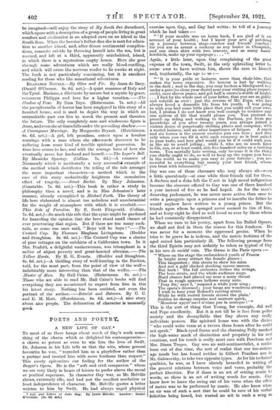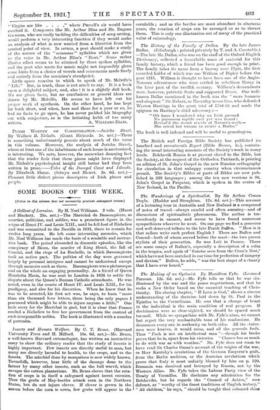POETS AND POETRY; A NEW LIFE OF GAY.* To most
of us there hangs about much of Gay's work some- thing of the charm which so delighted his contemporaries— a charm so potent as even to win him the love of Swift. Dr. Johnson in his Life tells us that the wits, whose general favourite he was, " regarded him as a playfellow rather than a partner and treated him with more fondness than respect." This surely epitomizes our feeling for the author of the Beggar's Opera. He is the " soft and civil companion " whom wo aro very likely in hours of leisure to prefer above the moral or poetical superman. In character Gay 'was, as Mr. Melville shows, extremely idle, and had not the smallest resolution or least independence of character. Mr. Melville quotes a letter written to him by Swift. He had always urged physical
• Life and Letters of John Gay. By Lewis Melville. London : Daniel O'Connor. [Se. Sd. net.]
exercise upon Gay, and Gay had writte i to tell of a journey which he had taken :—
" If your ramble was on horse back, I am glad of it on account of your health ; but I know your arts gf patching up a journey between stage-coaches and friends coaches : for you are as arrant a cockney as any hosier in Cheapsido, and one clean shirt with two cravats, and as many hand- kerchiefs, make up your equipage ; . . . ' ".
Again, a little later, upon Gay complaining of the great expense of the town, Swift, in the only upbraiding letter ha seems ever to have written him, shows the man to himself and, incidentally, the age to us :- " It is your pride or laziness, more than chair-hire, that makes the town expensive. No honour is lost by walking in the dark ; and in the day, you may beckon a blackguard boy under a gate [to clean your shoes] near your visiting place (experto credo), save eleven pence, and-get half a crown's-worth of health . I find by the whole cast of your letter, that you are as giddy and volatile as ever : just the reverse of Mr. Pope, who has always loved a domestic life from his youth. I was going to wish you had some little place that you could call your own, but, I profess I do not know you well enough to contrive any one system of life that would please you. You pretend to preach up riding and walking to the Duchess, yet from my knowledge of you after twenty years, you always joined a violent desire of perpetually shifting places and company, with a rooted laziness, and an utter impatience of fatigue. A coach and six horses is the utmost exercise you can bear ; and this only when you can fill it with such company as is best suited to your taste, and how glad would you be if it could waft you in the air to avoid jolting ; while I, who am so much later in life, can, or at least could, ride five hundred miles on a trotting horse. You mortally hate writing, only because it is the thing you chiefly ought to do, as well to keep up the vogue you have in the world. as to make you easy in your fortune : you are merciful to everything but money your best friend, whom you treat with inhumanity.'
Gay was one of those charmers who may always sit—even a little querulously—at ease while their friends toil for them. A duchess and a duke left the Curt in high moral indignation because the sinecure offered to Gay was one of three hundred a year instead of five as he had hoped. As for the man's deserving preferment, he was never more active than once to
write a panegyric upon a princess and to inscribe the fables ho would anyhow have written to a young prince. But the friends upon whom he sponged never seemed to tire of him, and at forty-eight he died as well loved as ever by those-whom he had constantly disappointed.
When we turn to his poetry, apart from his Ballad Operas, we shall not find in them the reason for this fondness. He was never for a moment the oppressed genius. When he tries to be grave he is tedious, and the metric fashions of the aged suited him particularly ill. The following passage from the third Epistle may not unfairly be taken as typical of Gay in his vers de societe vein. The theme is the Paris opera Where on the stage the embroidered youth of Franco
In bright array attract the female glance :
This languishes ; this struts to show his mien And not a gold clocked stocking moves unseen. But hark ! The full orchestra strikes the strings, The hero struts, and the whole audience sings.
Hard chance had placed me near a noisy throat That in rough quavers bellows every note. Pray Sir,' says I, suspend a while your song ; The opera's drowned ; your lungs are wondrous strong ;
I wish to hear your Roland's ranting strain
While he with rooted forests strows the plain.'
,Sudden he shrugs surprise and answers quick, `Monsieur appar' me nt n'aime pas la musique ! ' " This is the sort of thing that Young, for example, did well and Pope excellently. But it is not till he is free from polite society and the decasyllable that Gay shows any really individual powers. His spiritual home- was with the divine " who could write verse at a tavern three hours after he could not speak." Black-eyed Susan and the charming Polly marked the high-water mark of distinction and propriety in his real creations, and his touch is really most sure with Peachum and Mrs. Diana Trapes. Gay was an anti-sentimentalist, a realist born out of due time, the sort of realist that our too-serious age needs but has found neither in Gilbert Frankau nor in Mr. Galsworthy, to take two opposite types. As for his technical qualities, he was, as I have already hazarded in writing of the general relations between voice and verse, probably the
perfect librettist. For if there is an art of setting music to words, so there is an art of writing words for music. Gay knew how to leave the swing out of his verse when the office
of metre was to be performed by music. He also knew when an air was of such a sort that he could be sure of his verbal
felicities being heard, but wasted no wit in such a song as
" Virgins are like . . . ," where Pttrcell's air would have overlaid it. Composers like Mr. Arthur Bliss and Mr. Eugene Goessens, who are really tackling the difficulties of song setting, would perform a very interesting function if they would make an analysis of what is now wanted from a librettist from the musical point of- view. In return, a poet should make a study of the nature of the " nonsense " syllables which are given to the voice in Mr. Arthur Bliss's " Rout." Some rather illusive effect seems to be attained by these spoken syllables, and the poet who wrote for music might not impossibly glean some hints from a choice of vowels and consonants made freely and entirely from the musician's standpoint.
Little space remains in which to speak of Mr. Melville's " Life." But, in truth, there is not much to say. It is a book upon a delightful subject, and, alas ! it is a slightly dull book. We are given facts, but no conclusions or general ideas arc drawn by Mr. Melville. He seems to have left out his proper work of synthesis. On the other hand, he has kept his book short, and when, here and there for a year or so, he had no facts to go upon, he has never padded his biography out with conjecture, as is the irritating habit of too many



































 Previous page
Previous page